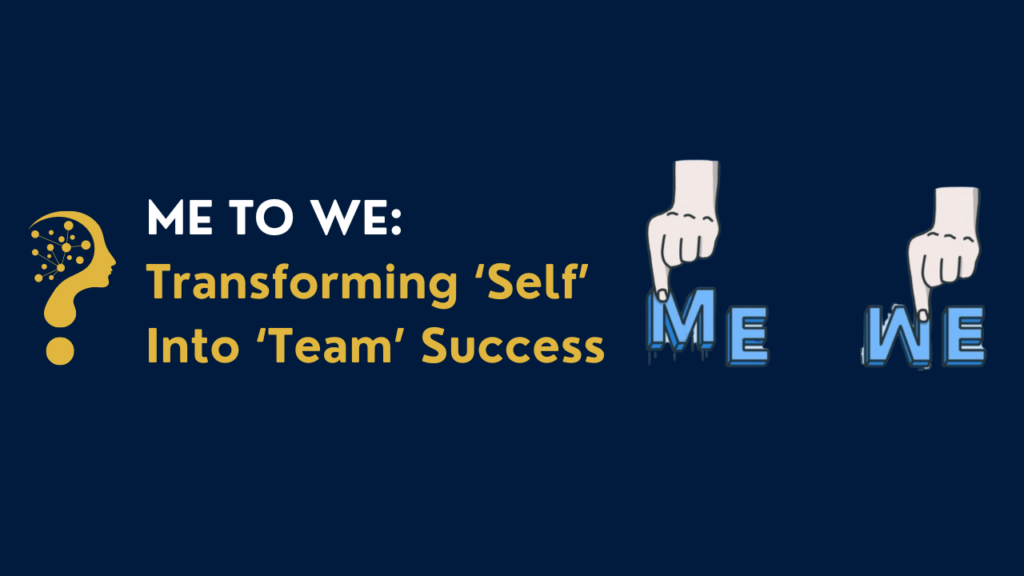
In a world that often emphasises individual achievement, the concept of shifting from “me” to “we” in teamwork emerges as a transformative approach to collaboration and success. The essence of effective teamwork lies not just in combining talents but in nurturing a shared purpose and collective identity. This idea resonates deeply with Tuckman’s model of group development, which outlines the stages of forming, storming, norming, and performing, highlighting how unity and cohesion are essential for moving beyond individual contributions towards shared goals.
In my recent TED Talk, I explored this very theme during my “Me to We” session, sharing personal insights and reflecting on the profound impact that a collaborative mindset can have on both individuals and teams. Embracing this shift not only enhances productivity but fosters a sense of belonging and mutual support, ultimately leading to achievements that are far greater than any one person could attain alone.
Here’s an example of how the concept aligns with each of Tuckman’s stages of group development:
- Forming
Team members tend to concentrate on their individual roles and responsibilities, approaching the situation with a mindset centred on “me.” At this early phase, individuals are exploring the environment and beginning to familiarise themselves with one another, often uncertain about the group’s dynamics.
Me Focus: Participants are primarily concerned with understanding how they integrate into the team, defining their roles, and anticipating the benefits they will receive from the experience.
- Storming
This stage is characterised by conflict, as differing perspectives and objectives commonly collide. At this point, individual egos and personal ambitions can overshadow team interactions, making collaboration a significant challenge.
Transition from Me to We: Friction emerges when team members prioritise their own visions, creating obstacles that need to be addressed in order to shift towards a more unified, collective mindset.
- Norming
In this phase, the team begins to establish common norms, clearly defined roles, and a cohesive sense of unity. Members transition from a focus on personal accomplishments to prioritising the success of the team as a whole, marking the true emergence of the shift from “me” to “we.”
We Focus: Team members actively embrace collaboration, recognising that shared success is advantageous for all. The emphasis is placed on team objectives, with individual recognition taking a backseat to collective achievements.
- Performing
The team operates effectively as an integrated whole. Members have completely embraced the “we” mentality, concentrating on how their individual efforts contribute to the team’s broader objectives rather than seeking personal recognition.
Complete We Focus: The team is now synchronised around shared goals, with members depending on each other’s strengths and appreciating that success is rooted in their collective efforts.
- Adjourning
As the team completes its work and separates after finishing the task, members take the opportunity to reflect on their collective achievements. In this phase, individuals come to appreciate the significance of teamwork, acknowledging that the collaborative “we” mentality proved far more beneficial than any individual “me” contributions.
I believe it’s essential to reflect on the profound impact this shift can have on teamwork and collaboration. In our interconnected world, embracing a collective mindset not only enhances cooperation but also fosters innovation and resilience. This concept resonates deeply with Tuckman’s stages of group development, which highlight the necessity of forming, storming, norming, and performing. By moving from individual perspectives towards a unified goal, teams transform challenges into opportunities for growth, ultimately achieving a synergy that exceeds the sum of its parts.
During my TED Talk, I shared personal anecdotes and practical strategies that illustrate this powerful transition. By recognising our interconnectedness and the potential that arises when we collaborate, we can inspire each other to strive for shared success. As we move forward, lets carry the spirit of “We” into every team, nurturing a culture of inclusivity and support.
